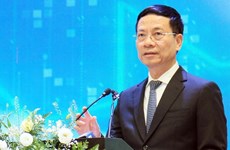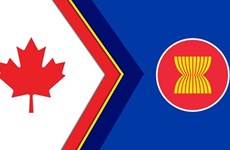ASEAN's relations with partners develop strongly and practically: Official
 (Source: thcasean.org)
(Source: thcasean.org)
Seoul (VNA) – Over the past 53 years, ASEAN's foreign relations have been expanded towards deeper and more practical
orientations, helping to ensure peace, security, stability, cooperation and
development for member countries as well as the whole region, and enhancing the
grouping’s position in the world, said Phan The Thang, Deputy Head of Information and Data Unit under
the ASEAN-Korea Centre.
In an interview with the Vietnam News Agency’s correspondent in Seoul, the Republic of Korea (RoK), Thang said that the relationship between ASEAN and partners has been carried out through a diversity of cooperation frameworks, including the ASEAN Plus One (a dialogue partner), ASEAN Plus Three (China, Japan and the RoK), East Asia Summit (EAS), ASEAN Regional Forum (ARF) and ASEAN Defence Ministers’ Meeting Plus (ADMM ).
So far, the association has set up partnerships with 16 countries, many of which have become the grouping’s strategic partners, including the US, China, the EU, Russia, Japan, India, the RoK, Australia and New Zealand, he noted.
Many cooperation programmes and plans have been implemented in various areas such as politics-security, economy, socio-culture, he said, adding that the number of countries showing their interest to form a partnership with the association has risen in recent years.
ASEAN has also expanded and deepened relations with international organisations, including the United Nations and the Pacific Alliance. So far, 93 countries have sent their ambassadors to ASEAN.
According to Thang, as an initiative of ASEAN to promote trade among member countries and between the association and six major partners, the Regional Comprehensive Economic Partnership (RCEP) has been under negotiations since 2013. After six years of negotiations, 15 member countries, with nearly one-third of the world's population and about one-third of the global GDP, are striving to sign the deal in 2020.
These positive outcomes showed the support of partners for ASEAN’s central role in the shaping regional architecture as well as the ASEAN Community building, while showing their commitments in engaging in regional mechanisms led by ASEAN, Thang said.
He commented that the outstanding development in ASEAN’s foreign relations has helped the grouping’s economy thrive. Currently, ASEAN is the fifth biggest economy in the world with GDP of over 3.1 trillion USD in 2019, and the third biggest market with a population of over 654 million.
With the forecast growth of more than 5 percent per year, ASEAN is expected to surpass Japan to become the fourth largest economy in the world in 2025, said Thang.
However, Thang also pointed out challenges facing the association, including the fourth Industrial Revolution, trade tensions among world powers, and imbalanced trade as well as climate change, environmental crisis and population aging.
Regarding ASEAN-RoK relations, Thang held that the partnership is thriving in various fields. The two sides set up their dialogue relations in 1989 and upgraded their ties to a strategic partnership in 2010. Two-way trade rose 20 times and people-to-people exchange increased 100 times, he noted.
Currently, the RoK is the fifth trade partner and investor of ASEAN, while ASEAN is the second biggest trade partner and the third investment destination of the RoK. ASEAN is also the most popular tourist destination of Korean travelers, while the RoK attracted a large number of labourers, students and tourists from ASEAN.
Korean President Moon Jae-in has initiated and promoted the “New
Southern Policy” to deepen ties with ASEAN, while Korean leaders voiced
support for ASEAN’s central role in the region and actively engaged in
ASEAN-led cooperation mechanisms.
Thang held that ASEAN has
countered many challenges in both security and economy. The COVID-19 pandemic
has posed adverse impacts to the socio-economic situation in ASEAN member countries
as well as cooperation and exchange among the members and between ASEAN and
partners, he noted, stressing the need for the enhancement of the grouping’s
self-reliance for economic recovery.
In terms of security, the association has also faced many complications, including tensions in the East Sea, the Korean Peninsula and the Middle East, he said.
The official underlined the
need for ASEAN and the RoK as well as other partners to improve their capacity to
deal with the COVID-19 pandemic, minimising its impacts and promoting recovery and
sustainable growth, and continuing efforts to finalise the RCEP as schedule.
Noting that ASEAN and the RoK are enjoying fruitful coordination in
many fields, Thang held that the cooperation is crucial for economic
development in ASEAN member countries, while helping to maintain an
environment of peace, security and stability in the region, including security, safety and freedom of aviation and navigation in the
East Sea. On the other hand, ASEAN is also working closely with the RoK to
promote peace and prosperity on the Korean Peninsula, Thang added./.













